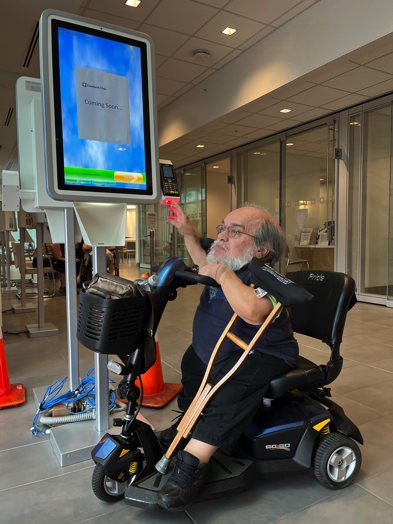
As one among 60 or so million people with disabilities in the United States, National Barrier Awareness Day is not a day that I need. Everyday I’m fully aware of barriers that impede the integration of people with disabilities in society. Yet the day is definitely needed by the people without disabilities who erect discriminatory barriers that exclude us from accessing education, employment, the built environment, health care, housing, and myriads of other programs and services.
Want to subscribe to receive blog updates sign up today!
When President Ronald Reagan first promulgated the day on May 07, 1986 he recognized that barriers inhibit or prevent so many of our fellow Americans from participating fully in the life of our society. He lamented the effect of barriers blocking the contribution of people with disabilities. However, his proclamation merely called for public understanding and awareness.
Reagan stopped short of calling for barrier removal. Instead he erroneously called for the public to appreciate the barriers people with disabilities must surmount. Absolutely not! We are not obliged to surmount barriers.
Today our focus must be on barrier removal. Just as Reagan boldly demanded Mr. Gorbachev to “tear down this wall” at the Brandenburg Gate in 1987, people with disabilities must demand offenders to tear down disability barriers. The time for soft-peddling and awareness programs won’t get the job done.
This year’s barrier awareness day requires a call for removal of barriers that obstruct major life activities like bending, breathing, caring for one’s self, communicating, concentrating, driving, eating, hearing, lifting, learning, parking, performing manual tasks, reaching, reading, seeing, shopping, sleeping, standing, talking, thinking, walking, wheeling, and working.
Given my stature of 40 inches, I’m continually confronted by reach barriers. For example in the last two weeks I’ve been unable to reach amenities in a hotel, medical building, dental office, and school. The hotel had several reach barriers:
- The check in counter was above my head making communication with the customer service representative difficult and signing the signature pad impossible.
- The bed was too high to climb onto.
- The thermostat set at 68 degrees Fahrenheit was too cold, but was too high to change.
- Service counters at the breakfast buffet and chef station were too high. We could not see or serve our own food.
At the medical center, a new self-check in machine was installed above my husband’s head and at the dentist, the receptionist was hidden behind a wall that was above my head. At the school I was visiting, the door was locked for security purposes and I was unable to reach the doorbell to announce my arrival. I also had to straddle two parking spaces due to there being no van accessible parking.
Although staff and friends provided an alternative means of accessing services in these scenarios, they all deprived me of independent use of the facility. As you can see, the necessity for barrier removal is frequent and the continuing need to tear down disability barriers can be overwhelming and requires perseverance.
What barriers have you persevered in tearing down?
Read more about breaking down barriers in book three of my dwarfism memoir trilogy, “ALWAYS AN ADVOCATE: Champions of Change for People with Dwarfism and Disabilities,”https://angelamuirvanetten.com/always-an-advocate/.

6 replies on “Barrier Removal Beats Awareness”
Recently I had to have my own folding stool to make my one day surgery at my local hospital comfortable. I f I hadn’t had my stool I couldn’t have got on to the bed, and use of the restroom. I am 4’3″.
It’s good that you were prepared Patreen, but the hospital should have been ready to make accommodations for you.
I haven’t conquered yet, but I’m on a mission to get a few stores to lower at least one POS.
Keep up the good work. It’s worth the fight. Be sure to document your steps along the way; so important for making your case and writing it up when you win!
I’m still at the ‘please stretch the EFTPOS machine down to my eye level’, and ‘bracing my feet on the bus seat in front of me/seeing only sky through bus windows’ stage. I have a folding stool I put in the supermarket trolley, but the staff where I shop are really people-focused and I seldom need it. (I’m 4’6)
I once put in a written complaint at another supermarket, about EFTPOS machines attached to the checkout counter above my view; I had asked how people in wheelchairs managed, and the assistant tried to tell me they raised themselves on one hand and did it with the other. NO they don’t, I declared.
Agree with you about wheelchair users not being able to reach as this staff person described. Talking to staff is the first step in making change. When this doesn’t work we need to find out if the inaccessible installation violates the law or is in compliance with a law that needs to be changed. Then we know whether to work on enforcement of a good law or changing a law that discriminates against people with disabilities.